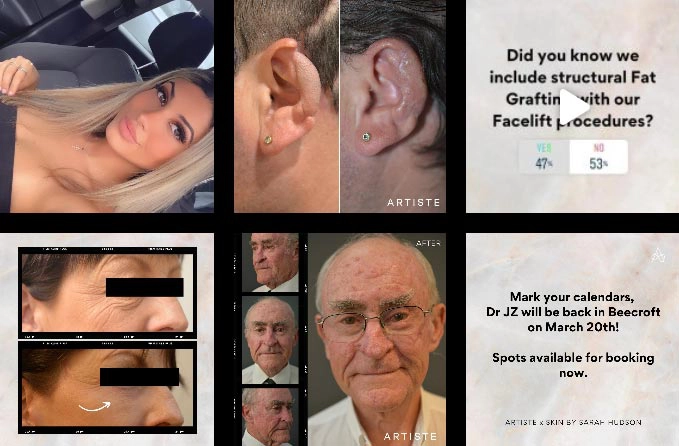Do I need to have a Neck Lift with a Facelift?
Model featured in photography
While the ageing process is a natural part of life, some individuals choose to explore surgical options like facelifts and neck lifts to address changes in the face and neck areas. It’s important to understand that combining these procedures is not necessary for everyone and that there is never a “need” for such elective surgeries.
We provide an overview of these options, focusing on what each procedure does and some considerations for those exploring either approach.
How does the Neck Lift work?
A neck lift typically involves incisions done behind the ear and along the lower hairline. The surgeon may sometimes add another incision under the chin, depending on their technique.
Some individuals may find that a neck lift may provide them with a more contoured appearance (but this is not a guaranteed outcome).
Any discussion regarding the removal of loose skin, fat, or muscle should be discussed with the surgeon.
Neck Lift Options:
Neck Lift alone
A neck lift alone may be adequate to address potential concerns some patients may have about the skin in their neck area, but it is not a required surgery, nor does this prerequisite another elective procedure (such as the face lift).
Patients may sometimes seek only a neck lift to reduce skin laxity or reposition / remove fat deposits in the neck.
In certain cases, though it is not a guarantee, a neck lift may help create a more “defined” neck or jawline. Again, consultation with a qualified specialist can help determine whether any surgery is aligned with a patient’s health profile and mental well-being.
Neck lift as part of Facelift
For individuals who are considering both facial and neck rejuvenation, a combined approach that includes a neck lift along with a facelift may address changes such as loose skin, loss of skin laxity, and concerns regarding contouring.
Most specialist plastic surgeons are comfortable combining these procedures from a logistical standpoint. However, from a safety perspective, they are more cautious about it.
This is because combining surgeries may also increase the duration of the procedure, potentially adding to the recovery time and level of post-surgery care required.
Risks like infection, scarring, and the potential for results that may not align fully with initial expectations are also a possibility.
Psychological Considerations In Combining A Neck Lift With A Facelift (Or Any Other Cosmetic Surgery)
Beyond the physical aspects, it’s vital for individuals to assess their motivations and expectations for cosmetic surgery. Conditions like Body Dysmorphic Disorder (BDD) can influence one’s perception of appearance, sometimes leading to repeated cosmetic procedures without satisfaction in results.
It’s recommended that individuals considering these procedures undergo screenings to rule out such conditions, ensuring that the decision to pursue cosmetic changes is based on healthy, realistic motivations.
If you’re considering a neck lift, facelift, or a combination of both, consult with a qualified practitioner who can provide a comprehensive evaluation. This consultation should cover not only the procedural aspects but also a detailed health assessment, psychological well-being, and the risks involved.
At Artiste Plastic Surgery, our specialists can help guide you through the options and offer insights that respect your individual health profile and goals.
Should you have any more concerns or questions about any cosmetic procedure, you may book a consultation with us.
Disclaimer: At Artiste Plastic Surgery, our Plastic Surgeons led by Dr Jack Zoumaras have been trained to the highest possible degree. All surgery has risks and it is always advised to get a second opinion. Risks are very real and we cannot guarantee any result. Results are illustrated as a guide only. All risks are managed and any need for revision surgery or complications (1-5%) can be managed by our specialist plastic surgeons.
Any statements on how you will feel is based on Level V Evidence:
Level V: How you will feel after plastic surgery varies between individuals, depending on psychological and physical factors. Our internal research is based on how patients in our practice feel after surgery.
The blogs are not a substitute for a medical consultation and do not form as part of the doctor to patient relationship.
SHARE THIS ARTICLE
Feb02
Planning Facial Surgery in Bondi Junction? What You Should Know
Disclaimer: At Artiste Plastic Surgery, our Plastic Surgeons led by Dr Jack Zoumaras have been trained to the highest possible degree. All surgery has risks and it is always advised ...
Feb02
Why Experience Matters: What to Look for in a Facial Plastic Surgeon
Disclaimer: At Artiste Plastic Surgery, our Plastic Surgeons led by Dr Jack Zoumaras have been trained to the highest possible degree. All surgery has risks and it is always advised ...
ABOUT ARTISTE
Artiste Plastic Surgery is an Award Winning Specialist Plastic Surgery practice led by internationally trained Dr. Jack Zoumaras, Plastic Surgeon and Peer Reviewed Face Surgeon
Artiste offers the latest Cosmetic Surgical Procedures of the Face, Breast and Body, inspired from leading centres around the world.
STAY IN THE LOOP
Enter your email address below to receive updates on new articles and VIP access to promotions and special offers.
FOLLOW US ON INSTAGRAM
